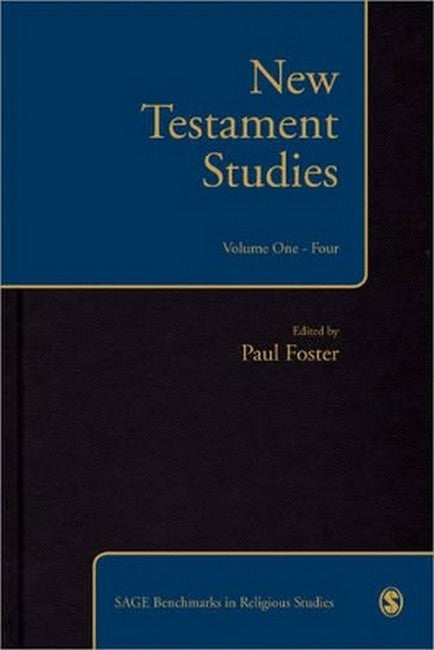VOLUME 1 The Multivalence of the Term "Original Text" in New Testament Textual Criticism - Eldon J. Epp Textual Criticism and Theology - David C. Parker Through a Screen Darkly: Digital texts and the New Testament - David C. Parker The Origin of the Nomina Sacra: A proposal - Larry W. Hurtado Recent Advances in Computational Linguistics and their Application to Biblical Studies - J. Jose Alviar Postcolonial Biblical Criticism: Taking stock and looking ahead - Fernando F. Segovia The New Testament and Intercultural Exegesis in Africa - Jean-Claude Loba-Mkole Methodological Rivalries: Theology and social science in Girardian interpretations of the New Testament - John Dunnill Eyewitnesses and the Oral Jesus Tradition - James D.G. Dunn Evangelicals and the Quest for the Historical Jesus - Samuel Lamerson The Galilee and Jesus in Recent Research - Mark Rapinchuk Jesus and the Gentiles after Jeremias: Patterns and prospects - Michael F. Bird Educating Jesus: The search for a plausible context - Paul Foster Jesus, Judaism and the Covenant - Tom Holmen The Continuity between John and Jesus - Dale C. Allison The Circle of the Twelve: Did It exist during Jesus' public ministry? - John P. Meier The Words of Jesus: From oral traditions to written records in Paul and Q - Harm W. Hollander The Nazi Quest for an Aryan Jesus - Peter Head VOLUME 2 The Oxford Conference on the Synoptic Problem - Dan Batovici Experiments to Develop Criteria for Determining the Existence of Written Sources, and Their Potential Implications for the Synoptic Problem - Robert K. McIver and Marie Carroll A Century with the Sitz im Leben: From form-critical setting to gospel community and beyond - Samuel Byrskog The Gospel Community Debate: State of the question - Edward W. Klink, III Matthew: Apostate, Reformer, Revolutionary? - Donald A. Hagner Toward a Teleology of Peace: Contesting Matthew's violent eschatology - David J. Neville Why Did Matthew Get the Shema Wrong? A study of Matthew 22:37 - Paul Foster The Survival of Mark's Gospel: A good story? - Joanna Dewey Challenged At the Boundaries: a conservative Jesus in Mark's tradition - William Loader The Narrative Rhetoric of Mark's Ambiguous Characterization of the Disciples - Paul Danove Evocatio Deorum and the Date of Mark - John S. Kloppenborg Reading Recent Readings of Issues of Wealth and Poverty in Luke and Acts - Thomas E. Phillips "Love Your Enemies," the Golden Rule, and Ancient Reciprocity (Luke 6:27-35) - Alan Kirk Rejecting Violent Judgment: Luke 9:52-56 and its relatives - Dale C. Allison Historiographical Characteristics of the Gospel of John - Richard Bauckham Method in Fourth Gospel Studies: A way out of the impasse? - Steve Motyer Trials, Plots and the Narrative of the Fourth Gospel - Andrew T. Lincoln The Beloved Disciple as Eyewitness and the Fourth Gospel as Witness - Andrew T. Lincoln VOLUME 3 The Politics of Interpretation: The rhetoric of race and ethnicity in Paul - Denise Kimber Buell and Caroline Johnson Hodge The Concept of the 'Inner Human Being' (o` e;sw a;nqrwpoj) in the Anthropology of Paul - Hans Dieter Betz The Material Spirit: Cosmology and ethics in Paul - Troels Engberg-Pedersen Asceticism and Christian Identity in Antiquity: A dialogue with Foucault and Paul - Halvor Moxnes Sex Slaves of Christ: A response to Halvor Moxnes - Jorunn ?kland Asceticism and Christian Identity in Antiquity: A response - John Riches The Narrative Approach To Paul: An early retrospective - Bruce W. Longenecker Is Paul's Gospel Narratable? - Richard B. Hays German-Language Feminist Exegesis of the Pauline Letters: A survey - Luzia Sutter Rehmann Epistolography, Rhetoric and Letter Prescript: Romans 1.1-7 as a Test Case - Samuel Byrskog Paul Between Jews and Gentiles in Corinth - Jack T. Sanders On Becoming the Righteousness of God: Another look at 2 cor 5:21 - Morna D. Hooker The Incident at Antioch (Gal. 2:11-18) - James D. G. Dunn Whose Flesh? What temptation? (Galatians 4.13-14) - Troy W. Martin The Politics of Identity in Ephesians - Margaret Y. MacDonald The First Contribution to the pisti,j Cristou/ Debate: A study of ephesians 3.12 - Paul Foster "To Die Is Gain" (Philippians 1:19-26): Does Paul contemplate suicide? - N. Clayton Croy Colossians and the Pauline School - Angela Standhartinger Roman Crete and the Letter to Titus - George M. Wieland VOLUME 4 The Genre of Acts: Moving toward a consensus? - Thomas E. Phillips Madness in the Method? The acts of the apostles in current study - Todd Penner The 'We'-Passages in Acts: On the horns of a dilemma - J. M. Wedderburn Luke-Acts and the Imperial Cult: A way through the conundrum? - C. Kavin Rowe The Imperial Authority and Benefaction of Centurions and Acts 10.34-43: A response to C. Kavin Rowe - Justin R. Howell Exchanging Favour for Wrath: Apostasy in Hebrews and patron-client relationships - David deSilva Anti-Judaism in Hebrews? - Clark M. Williamson The Product of a Petrine Circle? A reassessment of the origin and character of 1 Peter - David G. Horrell The Use of "Story" in the Letter of Jude: Rhetorical strategies of Jude's narrative episodes - Robert L. Webb The Johannine Epistles and the Question of Early Catholicism - C. Clifton Black II Honor Discourse and the Rhetorical Strategy of the Apocalypse of John - David A. deSilva "Uncovering Her Wickedness": An inter(con)textual reading of revelation 17 from a postcolonial feminist perspective - Jean K. Kim The Millennium (Rev 20.4-6) as Heaven - Charles Homer Giblin Hindrance or Help: Does the modern category of 'Jewish-Christian Gospel' distort our understanding of the texts to which it refers? - Andrew Gregory The Gospel of Thomas - April D. DeConick The Gospel of Mary - Christopher Tuckett The Gospel of Peter - Paul Foster

